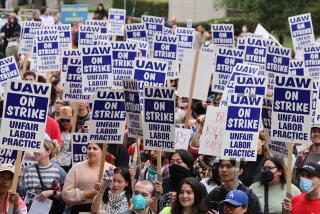Owing Back Dues Depends on Union Security Provision
- Share via
Question: In 1970, I hired on as a part-time employee while I went to school. Eventually, I went full-time with a seniority date of November 1973.
At the time, union membership was not required of employees. Later agreements made union membership mandatory for new hires.
At no time did I join the union or pay union dues or fees. For 30 years, I had been told that I had been “grandfathered in” as a pre-union-era employee and was exempt from such fees.
After a corporate merger, the union signed a new contract. Now I am receiving letters contending I owe nearly $1,000 in back dues.
Could that be correct?
--R.M., Mission Hills
Answer: You need to find out the facts immediately to avoid possibly being fired by your employer for nonpayment of union dues.
First, you should meet with the head of your union’s dues department.
Ask that person to guide you through the dues requirements in the union contract and the union’s constitution. Be sure to find out whether the contract contains a union security clause requiring your employer to terminate employees for nonpayment of union dues.
Even if the contract contains a union security clause, you cannot be charged dues for periods before the union security provision went into effect. In addition, you cannot be charged back dues if you were not given written notice of your dues obligation, detailed information about how the amount was calculated and an explanation of the consequences of failing to pay.
If the labor contract does not contain a union security clause, your union may be able to sue you to recover delinquent dues payments if you were given proper notice of your dues obligations.
If you are dissatisfied with the union’s explanation, you should consult an attorney or the National Labor Relations Board.
--Joseph L. Paller Jr.
Union, employee attorney
Gilbert & Sackman
Fairness of Policy on Holiday Pay Questioned
Q: At my company, field techs work four days for 10-hour shifts, while office personnel work five days, in eight-hour shifts.
But on major paid holidays, such as Christmas and Labor Day, my fellow field techs and I are paid only for eight hours, rather than our normal 10-hour workday. When we questioned the policy, we were told that if we wanted to be paid for 10 hours, we would have to use two hours from our vacation pool.
My human resources rep says it’s company policy.
Is this policy legal?
--D.F., Rancho Santa Margarita
A: There is no law that requires an employer to provide for paid holidays. However, if an employer has such a policy, then it can be legally enforced.
Your employer has a right to define how many hours it will pay for holidays. If it is the company’s policy to pay for eight hours per holiday, then that is all it is legally required to do.
The problem here, however, is possible vagueness. Perhaps the employer never specified the hourly limitation but just said you would be paid for your full workday.
It depends on how the company policy reads. Look at your employee handbook or any other company memo explaining the holiday pay program.
If you want to look at fairness, however, the employer could argue that it is really appropriate to pay for only eight hours.
Otherwise, you would be receiving a windfall benefit, constituting one-fourth of your weekly pay, compared with one-fifth of the weekly pay received by those working five-day weeks.
Even if you have an argument that company policy specifies pay on a “daily” basis instead of an hourly limitation, keep in mind the employer could redefine and clarify the policy at any time.
You might win a temporary battle over the amount to be paid for one past holiday but harm a long-term relationship with an employer who can change the policy in the future. Evaluate whether it is really worth it.
--Don D. Sessions
Employee rights attorney
Mission Viejo
Workers’ Comp May Cover Injury at Lunch
Q: Are employees covered under workers’ compensation when they are injured on company property during lunch?
--J.P., Altadena
A: An injury is covered under the workers’ compensation law if it arises “out of and in the course of the employment.”
Certainly, if there is a “working lunch,” during which the employee is performing any responsibilities for the employer, or if there is any restriction on the employee leaving during the lunch period, workers’ compensation would apply. It is even a possibility that it also would apply if the injury simply happened on company property.
The answer to your question may also depend on whether you are salaried or hourly. Courts have held that a salaried employee is paid during the entire workday, including the lunch hour.
A salaried employee may be considered to be acting within the “scope of employment” at all times during the day, including lunch breaks, and therefore might be covered under workers’ compensation.
So the answer is probably, but maybe not.
--Don D. Sessions
Employee rights attorney
Mission Viejo
*
If you have a question about an on-the-job situation, please mail it to Shop Talk, Los Angeles Times, P.O. Box 2008, Costa Mesa, CA 92626; dictate it to (714) 966-7873, or e-mail it to shoptalk@latimes .com. Include your initials and hometown. The Shop Talk column is designed to answer questions of general interest. It should not be construed as legal advice. Recent Shop Talk columns are available at www.latimes.com/shoptalk.
More to Read
Inside the business of entertainment
The Wide Shot brings you news, analysis and insights on everything from streaming wars to production — and what it all means for the future.
You may occasionally receive promotional content from the Los Angeles Times.










